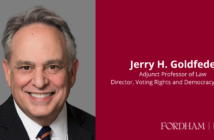The United States, home to about 5 percent of the world’s population, holds nearly 25 percent of its prisoners. How did the country get to the point of putting 2.2 million of its citizens in prisons?
In Locked In (Basic Books), John Pfaff uses data-driven research to dispel myths frequently trotted out to explain the unprecedented 40-year boom in U.S. incarceration. The most widely accepted explanations—the failed War on Drugs, draconian sentencing laws, an increasing reliance on private prisons—do not actually explain much at all about the phenomenon. And while there are many players involved in the prison population drama, Pfaff’s work shows that the roles of most of them—higher judicial and executive positions such as judges, governors, and presidents—are not as consequential as generally assumed.
Pfaff instead homes in on the previously inconspicuous part that prosecutorial discretion has played in enlarging the prison population. Although police initially make the arrests, prosecutors decide whether to bring a case or drop charges, file a complaint as a misdemeanor or a felony, and command a prison sentence or a lesser punishment. In other words, prosecutors exercise considerable power. Since most cases are resolved through plea bargains, prosecutors—not judges or juries—negotiate whether and for how long a defendant goes to prison.
For this reason, Pfaff urges readers to consider the major shift in prosecutor behavior that occurred in the mid-1990s, when prosecutors began bringing felony charges against arrestees about twice as often as they had before.
Pfaff’s research has led to op-eds on Slate and in the Washington Post, an interview with New York Times columnist David Brooks, and quotes in the Wall Street Journal and the Economist, among other media appearances.
A groundbreaking examination of the U.S. system of imprisonment, Locked In reveals the true causes of mass incarceration as well as the best path to reform.
Pfaff is a professor of law.




